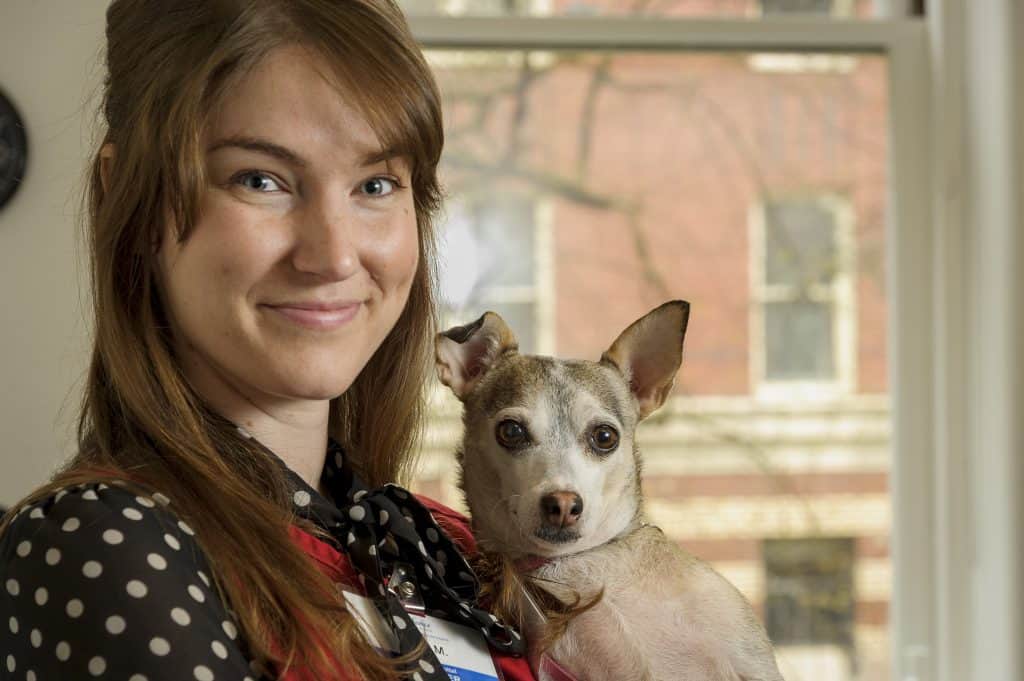St. Paul’s pet therapy program brings joy to patients
It is an ancient scientific law based on repeated experimentation and observation: If you look at a dog long enough, eventually you will smile.
It is this magical and timeless canine-human dynamic that is the foundation of pet therapy. That dogs engender happiness, warmth and security in humans dates back to hunter-gatherer societies, where the relaxed canine was a sign to our cave-dwelling ancestors that all was safe and sound.
Theories attribute our enduring love and respect for dogs to the fact that they helped our species survive. This is not hard to imagine when, in centuries past, you wouldn’t know what was going to step out of those woods next. You can see the good sense in having a dog around.
Today, little has changed. Dogs still make us feel safe and secure, warm and happy. And in a hospital setting, it has been shown that dogs can improve a patient’s “social, emotional, or cognitive functioning.”
The proof is in the pudding, or rather, the kibbles. The prevalence of animal assisted therapy programs in hospitals worldwide speaks to the fact that there are significant benefits for patients.
“When patients hold Maggie,” says pet therapy volunteer Katie McCloskey, of her terrier/chihuahua mix, “it releases something. Maggie brings out smiles in patients. It can be very emotional. I’ve experienced many moving moments.”
Katie is quick to point out that she benefits, too, right along with patients.
“Obviously, no one wants to be in hospital,” she says, “so when you can play a role in brightening a person’s day a little, it’s a wonderful feeling. I’ve read articles that say volunteerism enhances your own well-being and it’s true. It’s not only patients and their families that feel great as a result of this experience—I do, too.”
Pet Therapy at St. Paul’s
St. Paul’s currently has six owner/dog teams of pet therapy volunteers, so on most days you can usually bank on a dog being somewhere in the hospital.
According to Brandon Biln, Coordinator of Volunteer Resources at St. Paul’s, the pet therapy program operates mostly on word-of-mouth, which, for now at least, Brandon says is probably for the best.
“If word gets out and more people know about this program,” says Brandon, with a smile, “we would never be able to keep up with requests! It can be tough to do that even now. We are always on the lookout to recruit new volunteers.”
Last year, Brandon applied for and received an EPC grant (Enhanced Patient Care) from St. Paul’s Foundation to support his pet therapy volunteer training efforts. This year, he plans to apply for an EPC grant to support volunteer recruitment in order to keep up with demand.
The EPC program is funded by donations to St. Paul’s Foundation and supports dozens of departments and programs hospital-wide. Calls for applications are announced in late spring (St. Paul’s staff are encouraged to watch for it in PHC News and other media) and grants are awarded in late summer.
Pet therapy, Brandon says, is most beneficial for patients who are either longer term or somewhat ambulatory. This explains the frequency with which the dogs are requested, often by occupational therapists and social workers, in areas such as palliative care, mental health and the eating disorders clinic.
Katie, however, says that she and Maggie get lots of special requests and have been “all over” St. Paul’s, including cardiopulmonary and ICU.
As the week of April 28 – May 2 is Patient Experience Week, what better way to celebrate this special time than to support this wonderful patient-focused program?
Do you know anyone with a dog suitable for pet therapy? If yes, Brandon and his team are waiting. Contact Volunteer Resources at St. Paul’s today.
Meanwhile, friends of St. Paul’s can make a gift to support the EPC program any time by visiting this website.
